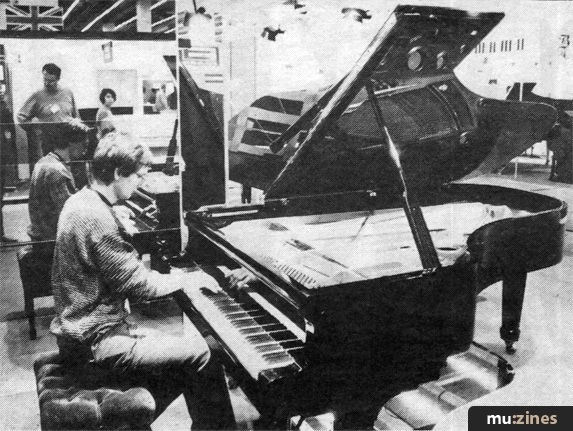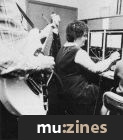Magazine Archive
Home -> Magazines -> Issues -> Articles in this issue -> View
Classical Style (Part 1) | |
Article from Making Music, February 1987 | |
Rock musicians have it tough, eh? But how hard is the life of a classical player?
How different are the lives of classical players to those of the rock fraternity. Pampered orchestral cats? No, they're not. Adrian Legg finds out from a singer at the heart of the classical scene.

"He who can, does. He who cannot, teaches." The very wonderful George Bernard Shaw said that in one of his more pompous moments, and it has stuck.
We non-academic musos bodge and grunt away, with rare and bemused recourse to book or musical score, and we are out gigging before we can spell the word crotchit. Sorry, crochet.
But for the classical musician the academic side of life is never far away — whether as a pupil or a teacher, or both at once. The process of acquiring and exercising enormous technique continues as part of the life, and teaching it becomes a natural sharing of the gift.
So what makes a classical musician tick? Well, not fame and publicity. The singer I spoke to in order to learn some of the answers was under-whelmed by the prospect of having her name in the paper, and insisted on anonymity for professional reasons. Thus the first difference between them and us.
Elsewhere there are remarkable similarities in the two lifestyles — take practising. She has the neighbour-banging-on-wall problem of a heavy metal guitarist (without the escape of headphones) but contained in a rib cage that could blow up lorry tyres.
Our singer went through initial training that took in nine O-levels, a scholarship at the Royal Manchester College of Music (four years on everything from singing to elocution to drama to history of music), and then a stint for the Welsh National Opera, "...really to get my Equity card." That's the all-important union card for 'stage' professions.
PAYING THE DUES
She left the Welsh Nats after almost a year: "That was about as much as I could stand, quite honestly.
"It was very much touring, a lousy job from that point of view... things like a six week northern tour, which took you right up to Christmas that was just hell — Birmingham, Leeds, Manchester — all the large opera houses.
"It was shitty as well because you'd rehearse in the morning, get the afternoon off, then have a performance in the evening. You never had any life of your own. You got thoroughly spotty from all the make-up, and your hair went funny from all the wigs. I just felt a wreck, very hard work, bloody boring."
BREAKING INTO SESSIONS
With her Equity card finally written up it was back to London, and freelance, and the BBC Singers.
"You just write in and go on their cattle-market auditions. I did quite a bit, it built up, you have to work your way in. I started at the bottom of the ad-hoc list, liable to get rung up at very short notice rather than booked in my own right. You just sit by the phone and twiddle your thumbs."
THE AUDITION
After several years freelancing for the Beeb throats, there was the chance of a full time contract. But this meant another, even stiffer audition.
"You have a standard set-piece from 'The Messiah', then one of your own choice, then they start on about 20 minutes or more sightreading. They start with an eliminator, in my case a Bach thing that was just black with semi-quavers page after page. At one point I was going onto my knees running out of breath, but I knew if I stopped I would lose my note. I looked up and saw them absolutely collapsed in hysterics in the box. After that they give you progressively more contemporary and outrageous stuff to try and find your ceiling."
"YOU GOT THOROUGHLY SPOTTY FROM ALL THE MAKE-UP, AND YOUR HAIR WENT FUNNY FROM ALL THE WIGS."
What was the basic salary?
"About £8,000, and by the time I left four years later I was on £10,250."
DRUGS
Yup, athletes and Rock Stars aren't the only candidates for the tablet. Classical musicians are not keen on pursuing muscle building hallucinations, but they do worry about nerves, hence the application of the Beta Blocker. (Technically, Propranolol, prescribed in 10mg doses as a simple treatment for the physical effects of nerves, and in up to 160mg doses for control in heart disease. In the first instance, you still get scared, but you don't shake, basically.)
"That was mainly for solo work. I lost a lot of confidence at the Beeb, and also found I was doing sometimes far more difficult stuff than I'd done before, difficult contemporary solos. I was annoyed that my nerves interfered with my concentration, so whenever it was vital that I concentrated and counted like mad, then I'd take a beta-blocker so I could forget it."
Did many people use them?
"More than like to admit it, it's considered a bit shameful really."
How did you find out about them?
"From somebody else in the Singers who used them."
What did the doctor say about it?
"He was very nice about it, he heartily approved. I didn't actually use them that much, and once I'd used them a bit on routine outside solo work and discovered I could get through a concert without panicking I didn't need them any more."
THE FIGHTS
"You are under constant criticism. There's a lot of rivalry within the group, very few people say nice things to you, people are very ready to point out what you've done wrong."
But doesn't that happen when you're being taught?
"Not so destructively. I was used to being criticised, but there was an element of bitchiness as well... you were aware if you got a solo that people were listening and just waiting for you to make a mistake."
TECHNIQUE VERSUS FEELING
"At the Beeb, technique is nine-tenths of the game. They're not necessarily looking for beautiful voices, but incredible flexibility — you will be asked regularly to do things that are phenomenally difficult.
"I'm sure that led me towards teaching, and I think I've always been a far better technician than performer. You're aiming to turn into a sort of music machine. They flick a switch and you do exactly what's on the page — not a quaver more or less."
DEVELOPING THE CAREER
How about going solo?
"I'd said in my mid-twenties that I wouldn't make a decision until I could earn my living singing. I'd got to a comfy place in the Beeb, and I could have gone on to something else if I'd had the motivation, but I thought, why bother? It just wasn't a lifestyle that appealed to me. You can reckon on spending six months of the year out of the country, your time's not your own, and I've seen what was happening to a friend who is very dedicated. She has to write in her diary when she's going to wash her hair. She flies through for a day, Edinburgh, Land's End, over to Paris, back to John O'Groats via Bradford — it's a lousy life."
More orchestral horror stories next month.
Series - "A Classical Style"
Read the next part in this series:
A Classical Style (Part 2)
(MM Mar 87)
All parts in this series:
Part 1 (Viewing) | Part 2
More from these topics
Stagecoaching (Part 1) |
 The A&R Men |
Wrecks And Drugs And Rock 'N' Roll - Simon Garfield |
Stage Fright - Nerves |
 The Fame Game - Big George's Guide to Becoming The Biggest Thing The Music World Has Ever Seen |
Session Men Say Go - Sessionmen Special (Part 1) |
Tona De Brett's Vocal Points |
 Copyrights & Wrongs (Part 1) |
Getting A Record Out |
Musicians Switchboards |
Record Profits |
 Cut And Thrust - Cutting a record (Part 1) |
Browse by Topic:
Music Business
Performing
Publisher: Making Music - Track Record Publishing Ltd, Nexus Media Ltd.
The current copyright owner/s of this content may differ from the originally published copyright notice.
More details on copyright ownership...
Feature by Adrian Legg
Help Support The Things You Love
mu:zines is the result of thousands of hours of effort, and will require many thousands more going forward to reach our goals of getting all this content online.
If you value this resource, you can support this project - it really helps!
Donations for February 2026
Issues donated this month: 0
New issues that have been donated or scanned for us this month.
Funds donated this month: £0.00
All donations and support are gratefully appreciated - thank you.
Magazines Needed - Can You Help?
Do you have any of these magazine issues?
If so, and you can donate, lend or scan them to help complete our archive, please get in touch via the Contribute page - thanks!













